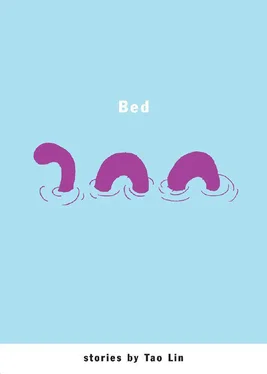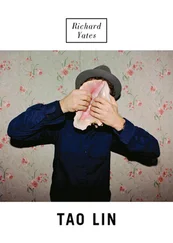Tao Lin - Bed
Здесь есть возможность читать онлайн «Tao Lin - Bed» весь текст электронной книги совершенно бесплатно (целиком полную версию без сокращений). В некоторых случаях можно слушать аудио, скачать через торрент в формате fb2 и присутствует краткое содержание. Год выпуска: 2007, Издательство: Melville House Publishing, Жанр: Современная проза, на английском языке. Описание произведения, (предисловие) а так же отзывы посетителей доступны на портале библиотеки ЛибКат.
- Название:Bed
- Автор:
- Издательство:Melville House Publishing
- Жанр:
- Год:2007
- ISBN:нет данных
- Рейтинг книги:5 / 5. Голосов: 1
-
Избранное:Добавить в избранное
- Отзывы:
-
Ваша оценка:
- 100
- 1
- 2
- 3
- 4
- 5
Bed: краткое содержание, описание и аннотация
Предлагаем к чтению аннотацию, описание, краткое содержание или предисловие (зависит от того, что написал сам автор книги «Bed»). Если вы не нашли необходимую информацию о книге — напишите в комментариях, мы постараемся отыскать её.
Bed — читать онлайн бесплатно полную книгу (весь текст) целиком
Ниже представлен текст книги, разбитый по страницам. Система сохранения места последней прочитанной страницы, позволяет с удобством читать онлайн бесплатно книгу «Bed», без необходимости каждый раз заново искать на чём Вы остановились. Поставьте закладку, и сможете в любой момент перейти на страницу, на которой закончили чтение.
Интервал:
Закладка:
“We’ll chalk their driveways,” Bernadette said. “We’ll write, ‘I am inside your house and will kill you.’ Then draw a ghoul. I’d freak out so bad.” She laughed. “We did stuff like that in high school. I miss it.”
After college, with her higher-education unassimilated and separate and dully stimulating as tropical fish — darting, slowing, and then not floating to the top but just sort of self-destructing — in the light-reflecting pond of her mind, Chelsea returned home to Florida, sat around the house for about a year (eating things, mostly), and, as a way to get out more and maybe make some friends, then, got a job at Denny’s.
That was in November, and now it was March, and Chelsea — the water of her mind lately fishless and still, though occasionally something enormous and blurry like the Loch Ness Monster would roll through, in a sort of cartwheel — still got nervous at work, most days had to sit in her car, breathing deep, from the stomach (little towels of air, warm and wrapping against the heart), before going in. But she was glad to have some social interaction, so as not to lose herself completely, as one could do that, she knew, could toss one’s life in a pile, like a nail clipper, with a lot of other stuff. It could get thrown out, by accident. And then you had to get a new one. But it wasn’t as good. Or maybe it was better — maybe sometimes it was better — so good you couldn’t remember the old one anymore.
After work, Chelsea didn’t want to go home, and called her dad. “I’m going to Wal-Mart first,” she said. “I might try on clothes.” A hat. Maybe there’d be a nice hat. “I might go to the bookstore too. So don’t worry.”
Her dad said he found a white dog. He said something about the stock market, and to buy a movie for him.
In Wal-Mart, the lights were bright and everywhere like in a surgical ward, though also cheap and paneled and vaguely irradiating like in an elementary school or TV UFO. Chelsea felt disembodied and wandered deep into the clothing section, then went back to her car, and then back in Wal-Mart, to the side of the store not the clothing section, where she found a discount bin, leaned over it — kind of wanting to climb in, like a kid — searched a while, and found a foreign movie she’d seen before, in college. She had downloaded it one night in her dorm room and watched it off her computer screen. It was about a man who suffered from existential despair. He suffered and suffered, and then someone shot him twice in the chest.
“This is a movie to watch on Halloween when the kids are out trick-or-treating,” said the register person, an old lady.
“Oh,” Chelsea said. “Why?”
“The film’s on sale,” said the old lady.
“It is?”
“First nothing’s on sale. Then five things. Then everything is free.”
“Oh,” Chelsea said, and almost said, “Cool,” as she had a thing — back in college, mostly — where she’d say, “Oh,” wait a moment, say, “Cool,” and then grin self-consciously. It was her way of saying, “I have no idea how to respond to what you just said. I have no idea, but other people, I’m sure, do. It’s my fault, not yours. I know I seem disinterested, or something. You shouldn’t trust that. I just didn’t know how to react. The grin means I’m amiable.”
In the parking lot, she drove and parked in a dark area with no other cars around. She reclined her seat, and listened to music. Outside there were trees, a ditch, a bridge, another parking lot. It was very dark. Maybe the Sasquatch would run out from the woods. Chelsea wouldn’t be afraid. She would calmly watch the Sasquatch jog into the ditch then out, hairy and strong and mysterious — to be so large yet so unknown; how could one cope except by running? — smash through some bushes, and sprint, perhaps, behind Wal-Mart, leaping over a shopping cart and barking. Did the Sasquatch bark? It used to alarm Chelsea that this might be all there was to her life, these hours alone each day and night — thinking things and not sharing them and then forgetting. The possibility of that would shock her a bit, trickily, like a three-part realization: that there was a bad idea out there; that that bad idea wasn’t out there, but here; and that she herself was that bad idea. But recently, and now, in her car, she just felt calm and perceiving, and a little consoled, even, by the sad idea of her own life, as if it were someone else’s, already happened, in some other world, placed now in the core of her, like a pillow that was an entire life, of which when she felt exhausted by aloneness she could crumple and fall towards, like a little bed, something she could pretend, and believe, even (truly and unironically believe; why not?), was a real thing that had come from far away, through a place of no people, a place of people, and another place of no people, as a gift, for no occasion, but just because she needed, or perhaps deserved — did the world try in that way? to make things fair? — it.
In the morning she looked puffy to herself in the mirror — not like a person at all, not like anything — and didn’t want to leave the house. She called in sick, went back to sleep, and woke in the afternoon. She washed her face, not looking at it, and went into the living room. Her dad was lying on the carpet, head propped up, watching the movie she’d bought him. A dog was walking around. It looked nervous and very small. Chelsea sat on the sofa and lay down and fell asleep, and then her dad was touching her shoulder and grinning. “I’m watching it again,” he was saying. “The movie made me feel good. I think I’ll watch it again.” The dog was barking somewhere and, in the vague panic and quicker learning of having just woken up, the world seemed obscure in a meticulous and exciting way, like in childhood, perhaps, and the feeling of that glided in, from some corner of the room, and filled the space in Chelsea from where once it had left. She was not really awake; or maybe was still asleep. She didn’t know. But she felt ready (for what, she couldn’t tell; just a kind of readiness), and was thinking that there were three of them, like a team or triangle, set to leave this place, safe because of the variety (man, animal, girl) and purposed because of the movie, and, liking the way she felt, then, smiled a little — prepared to travel, or whatever, to some unique and distractionless spot, thinking strange and illogical thoughts, and about to shrink into herself, to fit the small room of being asleep, the boxing-in and cardboard of it, like a shipment that stays, or a heart that goes, into a lung, and sits there, beating into itself, worldless and full.
In the spring, a few months after Chelsea’s high school classmates ran out on their check, Bernadette began to talk again about vandalizing them—“We should paint their windows black and superglue their front door”—and Chelsea looked forward to that. But after a while Bernadette stopped talking about it, then one night said she was moving to Seattle with her boyfriend, and a week later was gone. Chelsea was moved to the morning shift — her new manager was balding, with two sons at the community college — and found herself not knowing what to do each day after work. Sometimes she just drove around and listened to the radio. Then she began to sit in her room and go through all her old things, and found her social anxiety tapes, and listened to them, more out of boredom — or nostalgia, even, as sometimes she missed her teenage emotions, those moments when, alone, in her room, in the morning or at night, something in her would deepen, there would be a space and a rush, like a falls, and she would drop a little, into that depth, the secret lake of it, close and warm and wild as, she imagined, a best friend — than in an attempt to change (though of course there was a little hope; always, there was a little hope), but most days just fell asleep, anyway, before each half-hour tape ended, and so after a while just took to taking naps, naturally, without any tapes. One afternoon she had a dream. She and a boy were holding hands on a bus. It was a field trip. In the parking lot there were midgets, talking to her. The boy was in the distance, tall and shy and waiting, and she felt compassionate. She petted the midget’s heads, then tentatively picked up two of them — one in each arm — and grinned at the boy, who had a video camera and was filming the movie. She had an idea and hesitated, and picked up a third midget by having her two midgets pick up another midget.
Читать дальшеИнтервал:
Закладка:
Похожие книги на «Bed»
Представляем Вашему вниманию похожие книги на «Bed» списком для выбора. Мы отобрали схожую по названию и смыслу литературу в надежде предоставить читателям больше вариантов отыскать новые, интересные, ещё непрочитанные произведения.
Обсуждение, отзывы о книге «Bed» и просто собственные мнения читателей. Оставьте ваши комментарии, напишите, что Вы думаете о произведении, его смысле или главных героях. Укажите что конкретно понравилось, а что нет, и почему Вы так считаете.












